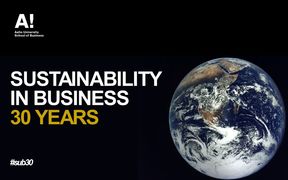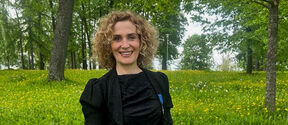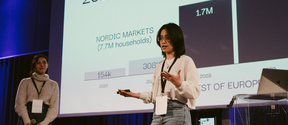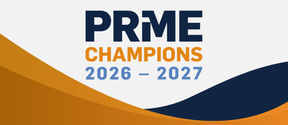Innovation for sustainability
Innovating new sustainable products, services, business models and forms of consumption can help tackle global challenges.


Innovating new sustainable products, services, business models and forms of consumption can help tackle global challenges.

Our research looks at several dimensions of the transition toward sustainability societies.

Circular economy keeps materials in use longer using strategies like reuse, remanufacture, recycling, and replacing ownership with rentals.

Cross-national governance of businesses make ethical issues urgent.
The latest publications from SUB researchers

Sustainability course offerings in the School of Business

The SUB lunchtime seminar series provides a monthly forum for all interested to discuss topical research in social and environmental issues in management.

Tuesday 9.12., 11:30-12:30
Ekonominaukio 1, U213
Kirsi Salonen, LUT University
Transitions to regenerative strategies
Thursday 13.11., 11:00-12:30
Ekonominaukio 1, T003
Tomas Roslin, Swedish University of Agricultural Sciences
Satu Teerikangas, University of Turku
Johanna Vähätalo, Ramboll
Biodiversity and business: What does biodiversity mean, and why is it important? How does it relate to business and organizing?
Thursday 30.10., 11:30-12:30
Ekonominaukio 1, X108 Alexander Sergejeff
Patrick Shulist, Aalto University School of Business
Positioning sustainability-oriented research in for management and sustainability-focused journals
Thursday 25.9., 11:30-12:30
Ekonominaukio 1, U213
Justine Loizeau, Aalto University School of Business
Jean-Philippe Decka, École Polytechnique
Clarifying business design with sufficiency: A systematic literature review
Wednesday 23.4., 12:00-13:00
Ekonominaukio 1, U213
Soumyo Das, Emlyon Business School
Orchestrating the interplay of time and place to address grand challenges
Wednesday 16.4., 12:15-13:15
Ekonominaukio 1, U213
Tulin Dzhengiz, Manchester Metropolitan University
Samuli Patala & Minna Halme, Aalto University School of Business
When global formal meets local informal: institutional interfaces in circular economy transitions
Thursday 6.2., 11:30-12:30
Ekonominaukio 1, U213
Maria Ehrnström-Fuentes, Hanken School of Economics
Multispecies organizing as a matter of care: the ethico-political dimensions of building regenerative and socioecological just worlds
Thursday 16.1., 11:30-12:30
Ekonominaukio 1, U213
Sini Numminen & Mikko Jalas, Aalto University School of Arts, Design and Architecture
Salvatore Ruggiero, LUT University
Arina Värä, University of Helsinki
Institutional complexity impacting electricity retailers’ tariff offerings and dynamic pricing and demand response services for households in and through the energy crises 2021–2024
Educational developer of the year 2023 award from the HSE Support Foundation. Read the announcement here.
Teacher of the year 2023 award from the HSE Support Foundation. Read the announcement here.
“Responsible Research in Management” Distinguished Winner for article: “Polycentric governance of privately owned resources in circular economy systems.” Journal of Management Studies, 59(6), 1563-1596. With Laura Albareda. 2023. Sponsored by the Academy of Management Fellows & Responsible Research in Business and Management. Read the announcement here.
Academy of Management, Social Issues in Management Division Best Paper Award of 2023. With Jennifer Goodman and Jouni Juntunen.
Alfred Kordelin Prize for key future actors who have created the conditions for a stronger, diverse, and sustainable society as well as a better future, 2022
Article "When Is There a Sustainability Case for CSR? Pathways to Environmental and Social Performance Improvements" (co-authored with Jukka Rintamäki and Jette Steen Knudsen) received Business & Society’s 2020 Best Paper Award
Finalist for the EGOS Best Student Paper Award with the paper “Risk organization and moral multiplexity in the EU biofuels market” (presented at EGOS Edinburgh 2019)
HSE Support Foundation Societal Impact Award, 2019
Thesis "Trash to Treasure: A Multiple Case Study of Finnish Companies That Create Economic Value from Waste Materials" received award for top university master's thesis, Association for Environmental Management (Ymparistöjohtamisen yhdistys ry), 2018
Article "Polycentric Governance of Privately Owned Resources in Circular Economy Systems" received Carolyn Dexter Award for international papers, Academy of Management 2018
Article "Powering sustainable innovations: Strategies for collaborating with deviant partners" won Best Academic Paper at R&D Management Conference 2016, University of Cambridge
Article "Innovation for Inclusive Business: Intrapreneurial Bricolage in Multinational Corporations", Journal of Management Studies, 2012 received the Emerald Citations of Excellence for 2015
Dive deeper into SUB's work through our blog posts and news articles.
Kestävyyden ajan tavoitteiksi pitäisi nostaa eko-sosiaalinen hyvinvointi, pitkän aikavälin taloudellinen kannattavuus ja resilienssi.

Blog post for Journal of Management Studies by Samuli Patala, Laura Albareda and Minna Halme

How can companies create sustainable value for the economy, the environment and society?

SUB scholars Minna Halme, Leena Lankoski and Mika Kuisma have won Business & Society’s 2020 Best Paper Award.
The newly funded T-Risk research project aims to shed light on transition risks in the maritime and aviation sectors, crucial for global trade and transportation.

Jouni Juntunen has been nominated to Network for Business Sustainability Sustainability Centres Community (SCC) Advisory Board for a three year period starting from 2021.































Member of the Sustainability Centres Community
SUB is a member of the Sustainability Centres Community (SCC), hosted by the Network for Business Sustainability (NBS).
Väre, Otaniementie 14
02150 Espoo
Karelia Dagnaud
karelia.dagnaud@aalto.fi